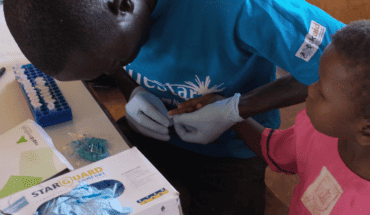New research, funded by Diabetes UK, has uncovered nine ‘core’ genes that directly impact the risk of type 1 diabetes. The genes – all linked to the immune system – reveal for the first time, new immune system pathways that are critical in type 1 diabetes development. These newly discovered pathways hold great potential to be new targets for immunotherapies to stop type 1 diabetes in its tracks.
The new findings come this Diabetes Week (12-18 June), as Diabetes UK highlights the relentlessness of living with all types of diabetes.
Type 1 diabetes is an autoimmune condition that occurs when the body’s immune system attacks the insulin-producing cells of the pancreas. This means the pancreas can no longer produce insulin. Living with type 1 diabetes is relentless and people with the condition need to monitor their blood sugar levels and calculate the exact amount of insulin to take, several times a day. Nearly 400,000 people in the UK are living with type 1 diabetes, and there is currently no cure.
Type 1 diabetes is caused by a complex mix of genetic and environmental factors. Many individual genes have previously been found to have a very small, cumulative effect on type 1 diabetes risk and – in combination with environmental triggers – play a role in its development. Knowing more about genes linked to type 1 diabetes, and the exact processes inside the body they control, can reveal new insights into how and why type 1 diabetes develops, and where to intervene to stop it.
In the new study, published in the American Journal of Human Genetics, researchers led by Professor Helen Colhoun and Professor Paul McKeigue at the University of Edinburgh developed a new method1 of analysing how different genes impact risk of developing type 1 diabetes. Their aim was to identify which genes are at the root of type 1 diabetes risk, and which have only small effects. The team examined genetic data from almost 5,000 people with type 1 diabetes and 7,500 people without type 1 diabetes, as well as analysing blood samples.
By looking at how genes regulate the activity of other genes, the team pinpointed, for the first time, nine new ‘core’ genes – all linked to the immune system – that directly and powerfully affect type 1 diabetes risk. Seven of these genes play a crucial role in regulating the immune cells that attack the pancreas in type 1 diabetes.
Two of the genes are linked to part of the immune system’s first line of defence, responsible for detecting threats, such as bacteria or viruses, and launching an immediate attack. This part of the immune system has not previously been associated with type 1 diabetes.
These pathways could in future be targeted with immunotherapies – treatments that work to reprogramme the immune system – to prevent or slow the development of type 1 diabetes.
Immunotherapies are a promising treatment avenue for type 1 diabetes, with the first ever immunotherapy that can delay onset of type 1 diabetes for up to three years – teplizumab – approved for use in the US last year. However, for everyone at risk of, or affected by type 1 diabetes to benefit, it is necessary to have armoury of treatments that can target the immune system’s many lines of attack.
The researchers hope their findings will lead to new treatments that could prevent the immune system attack that causes type 1 diabetes, further delay the onset of type 1 diabetes in those at high risk, or preserve beta cells that survive the immune attack following a diagnosis of type 1 diabetes.
Professor Paul McKeigue at the University of Edinburgh, said:
“At the beginning of the genome era in 2000, it was expected that the discovery of genes through which common variants cause disease, would rapidly lead to the development of new drugs.
“Until now researchers have studied the short-range effects of risk variants on nearby genes and found no obvious link to the risk of conditions or ways to treat them. Our study focused instead on the long-range effects of these risk variants on genes elsewhere on the genome. We have identified what appear to be ‘core’ genes for type 1 diabetes, some of which are potential therapeutic targets.”
Dr Elizabeth Robertson, Director of Research at Diabetes UK, which funded the study, said:
“Type 1 diabetes is a constant balancing act of blood sugar checks and insulin injections. We desperately need to find ways to prevent, delay and treat the condition, to spare hundreds of thousands of people the burden of managing their diabetes, day in, day out.
“This research has broken new ground in our understanding of genes that underpin type 1 diabetes, and how they contribute to the immune attack that causes the condition. The discovery that these ‘core’ immune system genes are central to the development of type 1 diabetes opens the door to a raft of new targets for immunotherapies that could prevent, delay or treat type 1 diabetes early on.
“With the first ever type 1 diabetes immunotherapy approved for use in the US last year, we are on the brink of a new era for type 1 diabetes therapies that could see it transformed from a lifelong condition to one that can be prevented, treated and ultimately cured.”
Diabetes UK is the UK’s leading charitable funder of diabetes research. The charity is currently funding around 140 research projects into prevention, treatments and potential cures for all types of diabetes. To find out more and support Diabetes UK this Diabetes Week, visit diabetes.org.uk.
1. The team developed a new method of adding up the effects of genetic variants across the entire genome, on the activity of each gene. The team identified nine ‘core’ genes through which common genetic variants act to cause type 1 diabetes.
- Gut microbiome could delay onset of type 1 diabetes - 3rd April 2025
- The da Vinci 5 Robot Is Set To Transform Bariatric Care: - 31st March 2025
- Beyond money: the hidden drivers fuelling child food insecurity - 31st March 2025






